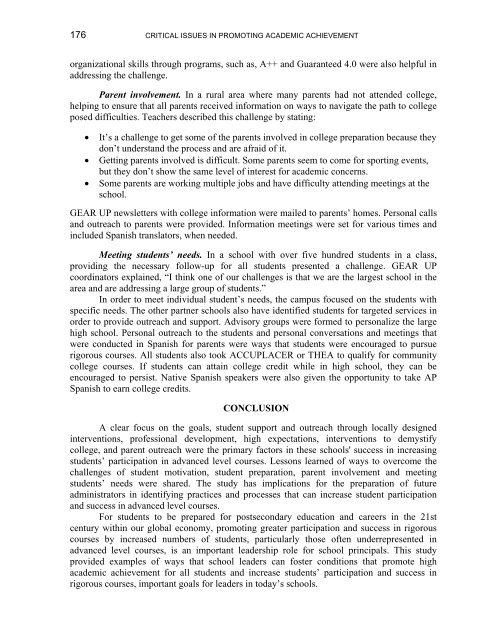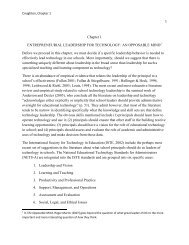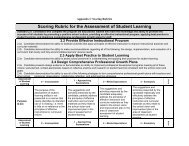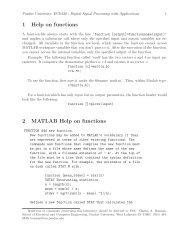- Page 1 and 2:
20 NCPEA 11 BLAZING NEW TRAILS: Pre
- Page 3 and 4:
NCPEA EXECUTIVE BOARD 2010-2011 Pre
- Page 5 and 6:
NCPEA HONOR ROLL OF PRESIDENTS, 194
- Page 7 and 8:
TABLE OF CONTENTS Contributing Auth
- Page 9:
Betty J. Alford, Stephen F. Austin
- Page 12 and 13:
xii Yearbook Reviewers Kenneth Rasm
- Page 15:
INVITED CHAPTERS PART 1
- Page 18 and 19:
4 PRESIDENT’S MESSAGE (3) The fed
- Page 21 and 22:
Shadows and Images II 7 LIVING LEGE
- Page 23 and 24:
Shadows and Images II 9 see little
- Page 25 and 26:
Shadows and Images II 11 settings,
- Page 27:
Shadows and Images II 13 into the m
- Page 30 and 31:
16 INVITED CHAPTERS Purpose of the
- Page 32 and 33:
18 INVITED CHAPTERS do not recogniz
- Page 34 and 35:
20 INVITED CHAPTERS Research Proced
- Page 36 and 37:
22 INVITED CHAPTERS Political maneu
- Page 38 and 39:
24 INVITED CHAPTERS CONCLUSION This
- Page 40 and 41:
26 INVITED CHAPTERS Johnson, R. B.,
- Page 43 and 44:
Complexities in the Workload of Pri
- Page 45 and 46:
Complexities in the Workload of Pri
- Page 47 and 48:
Complexities in the Workload of Pri
- Page 49 and 50:
Complexities in the Workload of Pri
- Page 51 and 52:
Complexities in the Workload of Pri
- Page 53 and 54:
Complexities in the Workload of Pri
- Page 55 and 56:
Complexities in the Workload of Pri
- Page 57 and 58:
Complexities in the Workload of Pri
- Page 59 and 60:
Complexities in the Workload of Pri
- Page 61 and 62:
47 CRITICAL ISSUES IN SHARED LEADER
- Page 63 and 64:
Professional Learning Communities:
- Page 65 and 66:
Professional Learning Communities:
- Page 67 and 68:
Professional Learning Communities:
- Page 69 and 70:
Professional Learning Communities:
- Page 71:
Professional Learning Communities:
- Page 74 and 75:
60 CRITICAL ISSUES IN SHARED LEADER
- Page 76 and 77:
62 CRITICAL ISSUES IN SHARED LEADER
- Page 78 and 79:
64 CRITICAL ISSUES IN SHARED LEADER
- Page 80 and 81:
66 CRITICAL ISSUES IN SHARED LEADER
- Page 82 and 83:
68 CRITICAL ISSUES IN SHARED LEADER
- Page 84 and 85:
70 CRITICAL ISSUES IN SHARED LEADER
- Page 86 and 87:
72 CRITICAL ISSUES IN SHARED LEADER
- Page 88 and 89:
74 CRITICAL ISSUES IN SHARED LEADER
- Page 90 and 91:
76 CRITICAL ISSUES IN SHARED LEADER
- Page 92 and 93:
78 CRITICAL ISSUES IN SHARED LEADER
- Page 95 and 96:
81 CRITICAL ISSUES IN SHARED LEADER
- Page 97 and 98:
Special Education Director Burnout
- Page 99 and 100:
Special Education Director Burnout
- Page 101 and 102:
Special Education Director Burnout
- Page 103 and 104:
Special Education Director Burnout
- Page 105 and 106:
Special Education Director Burnout
- Page 107 and 108:
93 CRITICAL ISSUES IN SHARED LEADER
- Page 109 and 110:
Superintendent Decision-making and
- Page 111 and 112:
Superintendent Decision-making and
- Page 113 and 114:
Superintendent Decision-making and
- Page 115 and 116:
Superintendent Decision-making and
- Page 117 and 118:
Superintendent Decision-making and
- Page 119 and 120:
Superintendent Decision-making and
- Page 121 and 122:
Superintendent Decision-making and
- Page 123 and 124:
CRITICAL ISSUES IN CRITICAL ISSUES
- Page 125 and 126:
Administrative Functions The Admini
- Page 127 and 128:
The Administration of Special Educa
- Page 129 and 130:
The Administration of Special Educa
- Page 131 and 132:
The Administration of Special Educa
- Page 133:
The Administration of Special Educa
- Page 137 and 138:
CRITICAL ISSUES IN PROMOTING ACADEM
- Page 139 and 140: The Effective Practices and Beliefs
- Page 141 and 142: The Effective Practices and Beliefs
- Page 143 and 144: The Effective Practices and Beliefs
- Page 145 and 146: The Effective Practices and Beliefs
- Page 147 and 148: The Effective Practices and Beliefs
- Page 149 and 150: CRITICAL ISSUES IN PROMOTING ACADEM
- Page 151 and 152: Creating Shared Meaning in High Per
- Page 153 and 154: Creating Shared Meaning in High Per
- Page 155 and 156: Creating Shared Meaning in High Per
- Page 157 and 158: Creating Shared Meaning in High Per
- Page 159 and 160: Creating Shared Meaning in High Per
- Page 161 and 162: Creating Shared Meaning in High Per
- Page 163 and 164: Creating Shared Meaning in High Per
- Page 165 and 166: Creating Shared Meaning in High Per
- Page 167 and 168: Creating Shared Meaning in High Per
- Page 169 and 170: Creating Shared Meaning in High Per
- Page 171 and 172: Creating Shared Meaning in High Per
- Page 173: Creating Shared Meaning in High Per
- Page 176 and 177: 162 CRITICAL ISSUES IN PROMOTING AC
- Page 178 and 179: 164 CRITICAL ISSUES IN PROMOTING AC
- Page 180 and 181: 166 CRITICAL ISSUES IN PROMOTING AC
- Page 182 and 183: 168 CRITICAL ISSUES IN PROMOTING AC
- Page 184 and 185: 170 CRITICAL ISSUES IN PROMOTING AC
- Page 186 and 187: 172 CRITICAL ISSUES IN PROMOTING AC
- Page 188 and 189: 174 CRITICAL ISSUES IN PROMOTING AC
- Page 193 and 194: CRITICAL ISSUES IN PROMOTING ACADEM
- Page 195 and 196: Principals and Teachers Stated Beli
- Page 197 and 198: Principals and Teachers Stated Beli
- Page 199 and 200: Principals and Teachers Stated Beli
- Page 201 and 202: Principals and Teachers Stated Beli
- Page 203 and 204: Principals and Teachers Stated Beli
- Page 205 and 206: Principals and Teachers Stated Beli
- Page 207 and 208: Principals and Teachers Stated Beli
- Page 209 and 210: Principals and Teachers Stated Beli
- Page 211 and 212: Principals and Teachers Stated Beli
- Page 213 and 214: CRITICAL ISSUES IN PROMOTING ACADEM
- Page 215 and 216: Distinguishing Practices for Admini
- Page 217 and 218: Distinguishing Practices for Admini
- Page 219 and 220: Distinguishing Practices for Admini
- Page 221 and 222: Distinguishing Practices for Admini
- Page 223 and 224: Distinguishing Practices for Admini
- Page 225: CRITICAL ISSUES IN SCHOOL IMPROVEME
- Page 228 and 229: 214 CRITICAL ISSUES IN SCHOOL IMPRO
- Page 230 and 231: 216 CRITICAL ISSUES IN SCHOOL IMPRO
- Page 232 and 233: 218 CRITICAL ISSUES IN SCHOOL IMPRO
- Page 234 and 235: 220 CRITICAL ISSUES IN SCHOOL IMPRO
- Page 236 and 237: 222 CRITICAL ISSUES IN SCHOOL IMPRO
- Page 238 and 239: 224 CRITICAL ISSUES IN SCHOOL IMPRO
- Page 240 and 241:
226 CRITICAL ISSUES IN SCHOOL IMPRO
- Page 242 and 243:
228 CRITICAL ISSUES IN SCHOOL IMPRO
- Page 244 and 245:
230 CRITICAL ISSUES IN SCHOOL IMPRO
- Page 246 and 247:
232 CRITICAL ISSUES IN SCHOOL IMPRO
- Page 248 and 249:
234 CRITICAL ISSUES IN SCHOOL IMPRO
- Page 250 and 251:
236 CRITICAL ISSUES IN SCHOOL IMPRO
- Page 252 and 253:
238 CRITICAL ISSUES IN SCHOOL IMPRO
- Page 254 and 255:
240 CRITICAL ISSUES IN SCHOOL IMPRO
- Page 256 and 257:
242 CRITICAL ISSUES IN SCHOOL IMPRO
- Page 258 and 259:
244 CRITICAL ISSUES IN SCHOOL IMPRO
- Page 260 and 261:
246 CRITICAL ISSUES IN SCHOOL IMPRO
- Page 262 and 263:
248 CRITICAL ISSUES IN SCHOOL IMPRO
- Page 264 and 265:
250 CRITICAL ISSUES IN SCHOOL IMPRO
- Page 266 and 267:
252 CRITICAL ISSUES IN SCHOOL IMPRO
- Page 268 and 269:
254 CRITICAL ISSUES IN SCHOOL IMPRO
- Page 270 and 271:
256 CRITICAL ISSUES IN SCHOOL IMPRO
- Page 272 and 273:
258 CRITICAL ISSUES IN SCHOOL IMPRO
- Page 274 and 275:
260 CRITICAL ISSUES IN SCHOOL IMPRO
- Page 276 and 277:
262 CRITICAL ISSUES IN SCHOOL IMPRO
- Page 278 and 279:
264 CRITICAL ISSUES IN SCHOOL IMPRO
- Page 280 and 281:
266 CRITICAL ISSUES IN SCHOOL IMPRO
- Page 282 and 283:
268 CRITICAL ISSUES IN SCHOOL IMPRO
- Page 284 and 285:
270 CRITICAL ISSUES IN SCHOOL IMPRO
- Page 287 and 288:
273 CRITICAL ISSUES IN SCHOOL IMPRO
- Page 289 and 290:
The Social Justice Implications of
- Page 291 and 292:
The Social Justice Implications of
- Page 293 and 294:
The Social Justice Implications of
- Page 295 and 296:
The Social Justice Implications of
- Page 297 and 298:
The Social Justice Implications of
- Page 299 and 300:
285 CRITICAL ISSUES IN SCHOOL IMPRO
- Page 301 and 302:
Name Exton Gateway Experiences with
- Page 303 and 304:
Experiences with PTELL in Six Illin
- Page 305 and 306:
Experiences with PTELL in Six Illin
- Page 307 and 308:
Experiences with PTELL in Six Illin
- Page 309:
Part 5 CRITICAL ISSUES IN EDUCATION
- Page 312 and 313:
298 CRITICAL ISSUES IN EDUCATION LE
- Page 314 and 315:
300 CRITICAL ISSUES IN EDUCATION LE
- Page 316 and 317:
302 CRITICAL ISSUES IN EDUCATION LE
- Page 318 and 319:
304 CRITICAL ISSUES IN EDUCATION LE
- Page 320 and 321:
306 CRITICAL ISSUES IN EDUCATION LE
- Page 322 and 323:
308 CRITICAL ISSUES IN EDUCATION LE
- Page 324 and 325:
310 CRITICAL ISSUES IN EDUCATION LE
- Page 326 and 327:
312 CRITICAL ISSUES IN EDUCATION LE
- Page 328 and 329:
314 CRITICAL ISSUES IN EDUCATION LE
- Page 330 and 331:
316 CRITICAL ISSUES IN EDUCATION LE
- Page 333 and 334:
CRITICAL ISSUES IN EDUCATION LEADER
- Page 335 and 336:
Service to the Profession: The Forg
- Page 337 and 338:
Service to the Profession: The Forg
- Page 339 and 340:
Qualitative Data Service to the Pro
- Page 341 and 342:
Service to the Profession: The Forg
- Page 343:
Service to the Profession: The Forg
- Page 346 and 347:
332 CRITICAL ISSUES IN EDUCATION LE
- Page 348 and 349:
334 CRITICAL ISSUES IN EDUCATION LE
- Page 350 and 351:
336 CRITICAL ISSUES IN EDUCATION LE
- Page 352 and 353:
338 CRITICAL ISSUES IN EDUCATION LE
- Page 354 and 355:
340 CRITICAL ISSUES IN EDUCATION LE
- Page 356 and 357:
342 CRITICAL ISSUES IN EDUCATION LE
- Page 358 and 359:
344 CRITICAL ISSUES IN EDUCATION LE
- Page 360 and 361:
346 CRITICAL ISSUES IN EDUCATION LE
- Page 362 and 363:
348 CRITICAL ISSUES IN EDUCATION LE
- Page 364 and 365:
350 CRITICAL ISSUES IN EDUCATION LE
- Page 366 and 367:
352 CRITICAL ISSUES IN EDUCATION LE
















